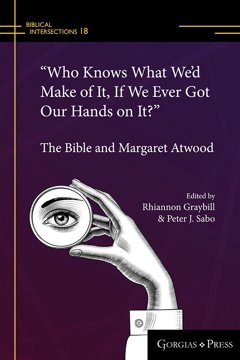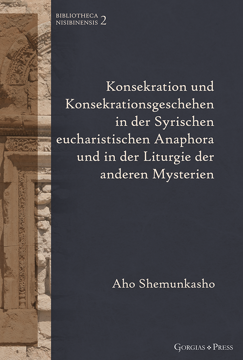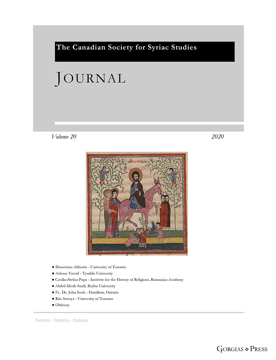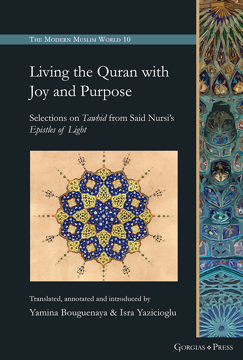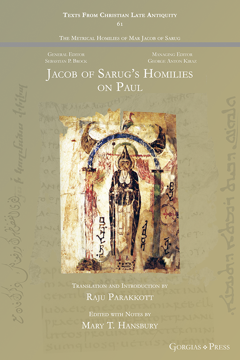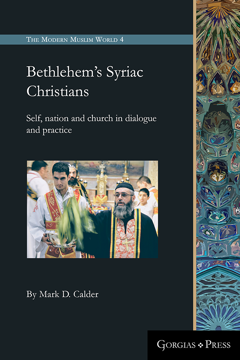“Who Knows What We’d Make of It, If We Ever Got Our Hands on It?” (paperback)
The Bible and Margaret Atwood
Edited by Rhiannon Graybill & Peter J. Sabo
Series: Biblical Intersections 18
ISBN: 978-1-4632-4258-9
In the nightstands of hotel rooms, kept under lock and key, in the poetry of a pre-apocalyptic environmental cult, and quoted by children, atheists, and murderers alike—the Bible is omnipresent in the work of Margaret Atwood. The Bible is found not only in her novels but also in her poetry, short stories, and non-fiction work. “Who Knows What We’d Make of It, If We Ever Got Our Hands on It?” assembles cutting edge literary and critical readings of Margaret Atwood and the Bible.
$65.00 (USD) $39.00 (USD)
Konsekration und Konsekrationsgeschehen in der Syrischen eucharistischen Anaphora und in der Liturgi
Series: Bibliotheca Nisibinensis 2
ISBN: 978-1-4632-4259-6
Am Beispiel der Initiationssakramente (Taufe, Firmung, Eucharistiefeier) und der Priesterweihe wird einerseits die Konsekration der Materie (Wasser, Myronöl, Brot und Wein) und des Empfängers dargestellt, anderseits das Konsekrationsgeschehen der einzelnen liturgischen Vollzüge nach der syrisch antiochenischen Liturgie miteinander verglichen, analysiert und kommentiert.
$123.00 (USD) $73.80 (USD)
Journal of the Canadian Society for Syriac Studies 20
Edited by Amir Harrak
ISBN: 978-1-4632-4262-6
A refereed journal published annually by the Canadian Society for Syriac Studies.
$75.00 (USD) $45.00 (USD)
Living the Quran with Joy and Purpose
Selections on Tawhid from Said Nursi's Epistles of Light
Series: Gorgias's Modern Muslim World 10
ISBN: 978-1-4632-4269-5
The current volume is an annotated translation of selections from a noteworthy Muslim theologian Said Nursi (1876-1960) on the Quranic theme of oneness of God (tawhid). Given the scarcity of theological themes in Islamic literature in English as well as the lack of studies on Said Nursi, who wrote in Ottoman Turkish, the book is an important contribution to the field. It offers a contemporary peek into the view that faith in God could be profoundly meaningful and fulfilling spiritual path.
$45.00 (USD) $27.00 (USD)
Jacob of Sarug's Homilies on Paul
On the Conversion of the Apostle Paul and a Second Homily on Paul the Apostle
Translation and Introduction by Raju Parakkott; Edited with Notes and Introduction by Mary T. Hansbury
Series: Texts from Christian Late Antiquity 61
ISBN: 978-1-4632-4273-2
Recognized as a saint by both Chalcedonian and non-Chalcedonian Christians alike, Jacob of Sarug (d. 521) produced many narrative poems that have rarely been translated into English. Of his reported 760 metrical homilies, only about half survive. Part of a series of fascicles containing the bilingual Syriac-English editions of Saint Jacob of Sarug’s homilies, this volume contains two of his homilies on Paul. The Syriac text is fully vocalized, and the translation is annotated with a commentary and biblical references. The volume is one of the fascicles of Gorgias Press’s Complete Homilies of Saint Jacob of Sarug, which, when complete, will contain all of Jacob’s surviving sermons.
$33.00 (USD) $19.80 (USD)
Bethlehem's Syriac Christians (paperback)
Self, nation and church in dialogue and practice
Series: Gorgias's Modern Muslim World 4
ISBN: 978-1-4632-4282-4
An anthropological study of Syriac Orthodox Christian identity in a time of displacement, upheaval, and conflict. For some Syriac Orthodox Christians in Bethlehem, their self-articulation - the means by which they connect themselves to others, things, places and symbols - is decisively influenced by their eucharistic ritual. This ritual connects being siryāni to a redeemed community or 'body', and derives its identity in large part from the Incarnation of God as an Aramaic-speaking Bethlehemite.
$60.00 (USD) $36.00 (USD)
